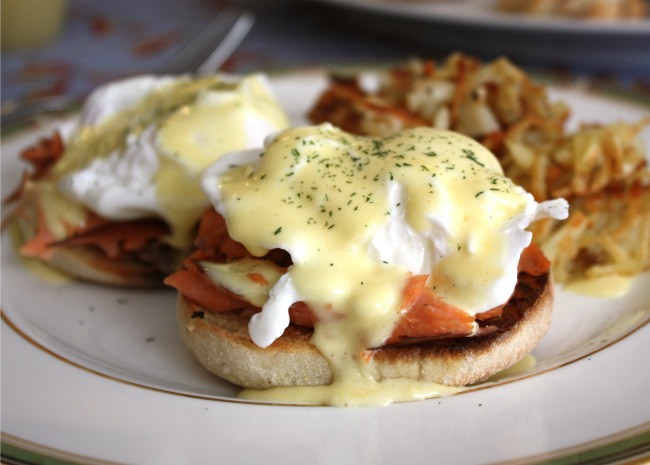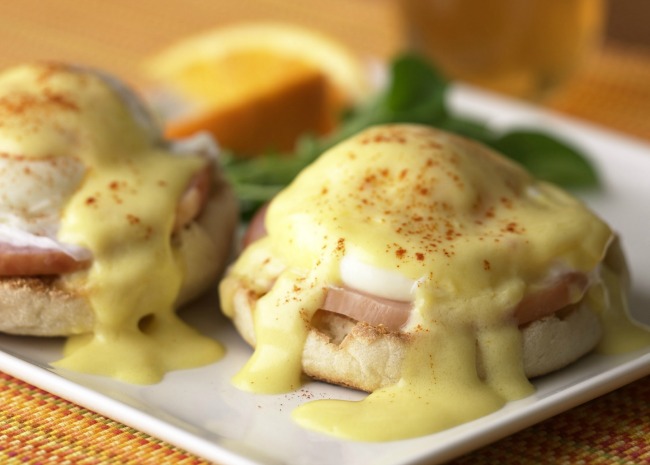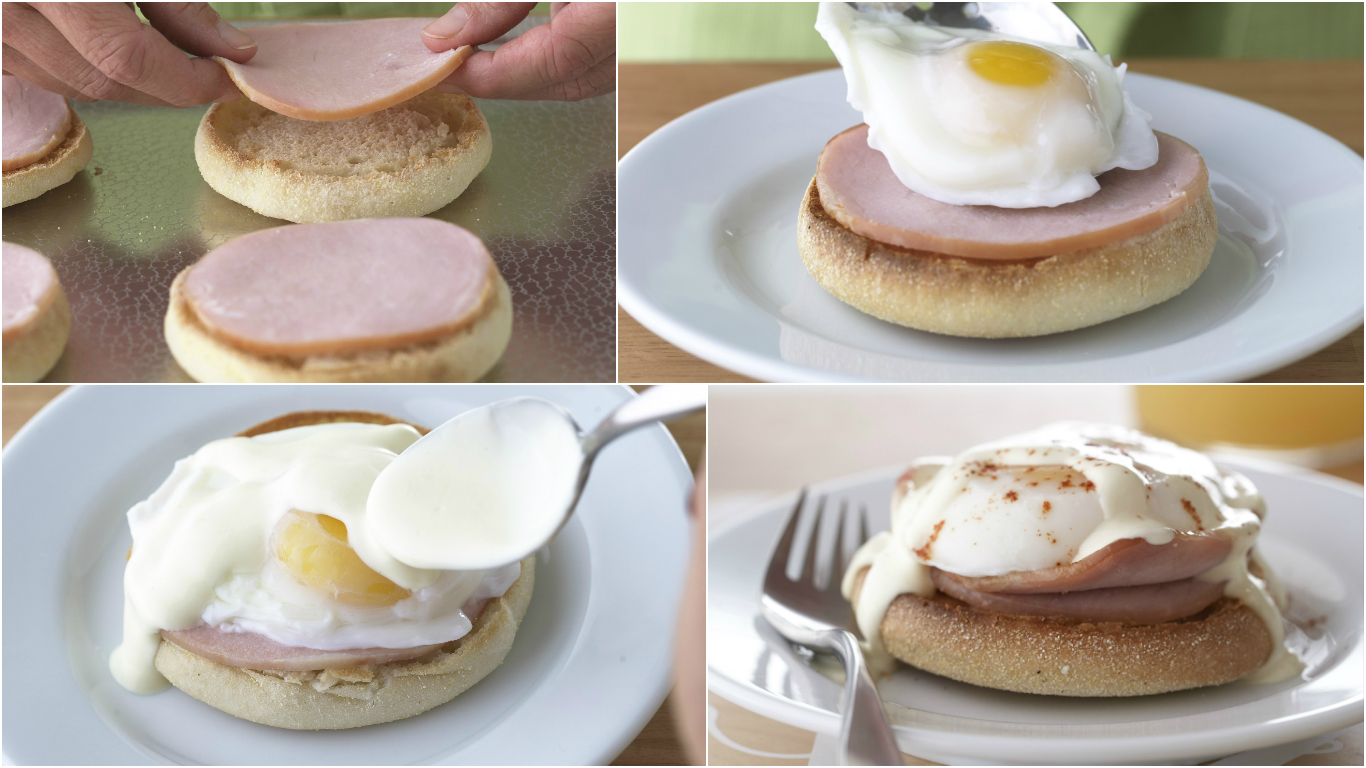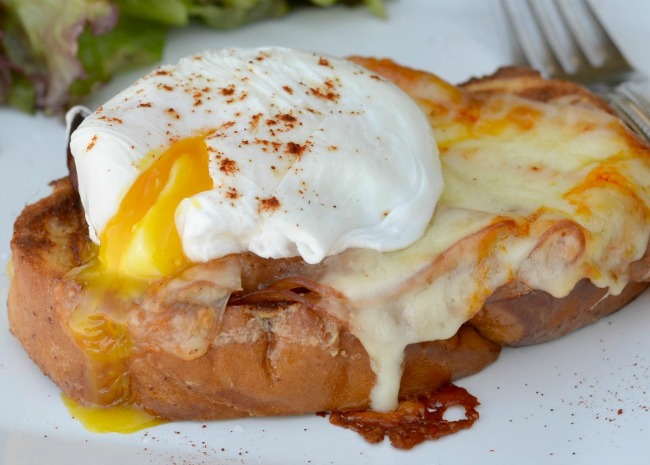How to Make Eggs Benedict
Eggs Benedict, it’s the brunch classic that always impresses.

Blender Hollandaise Sauce | Photo by eatcookdream
Break it down, though, and it’s just a few basic parts — toast, ham, poached eggs, and hollandaise. Nothing to intimidate, right?
Ultimately, conquering brunch with Benedict depends on doing two of these four things really well: poaching the eggs and rocking the hollandaise. Master these two make-or-break techniques and your Benedicts will rule brunch forever.
Begin by poaching the eggs. Add a tablespoon or two of vinegar to a pan of water and bring it just to a gentle simmer (rather than a jhard boil). Crack the egg first into a separate container. Now stir the water in a wide circle and add the whole egg. The slightly acidulated water will set the eggs quickly, while the whirlpool of water will keep the egg in a ball. Poach at a simmer for four to five minutes for set whites and soft yolks. Check out more tips on How to Make Poached Eggs.
Don’t be dazed by the hollandaise. Hollandaise sauce is really just an emulsion of eggs and butter. Okay, yes, the eggs and butter must be blended at just the right temperature — warm enough to melt the butter; cool enough not to scramble the eggs — and then the emulsion has to stay at pretty much that perfect temperature until served. The secret? A double-boiler and a Thermos! The double-boiler ensures the eggs won’t scramble as they heat, and the Thermos holds the sauce at the optimum temperature until brunch is served.
Carefully read the recipe, use a bowl set over simmering (not boiling) water, and stir, stir, stir. Hollandaise doesn’t like to be rushed. Take the time to make sure each step is done before moving on.

Beautiful Eggs Benedict | Photo by Meredith
No double boiler? No worries. Chef John makes his hollandaise without one. He does it in a metal bowl over a direct flame. Watch his video, Chef John’s Hollandaise Sauce, and you’ll see how to keep the sauce from breaking. He’ll also show you what to look for that signals your egg yolks are just right.
Of course, if you’re seeking the quickest, easiest way to make Hollandaise sauce, break out the blender. We have a video for Blender Hollandaise Sauce, too. This blended sauce won’t separate or break.
But no matter how you make it, Chef John’s most important piece of advice remains relevant: Attack your sauce with confidence because “a hollandaise can sense fear.”
- Creamy Hollandaise Sauce
- Southern Hollandaise Sauce
- Hollandaise Sauce
Building Your Benedict
Now let’s get creative. English muffins are, of course, the standard bread at the base of eggs Benedict. Their chewy texture contrasts nicely with the eggs, and helps absorb the sauce.

Building a classic | Photo by Meredith
But don’t get too stuck on English muffins. In fact, plain ol’ toast is often cited as the original bread for eggs Benedict — and really any toasted bread is excellent, from focaccia to challah. Would this include French toast? Mais oui! Even biscuits? Oh yes. For that matter, you could make a compelling case for laying down a base of hash browns.
A slice of Canadian bacon often comes next. But again, substitutions are the name of the game. Leftover holiday ham is always a popular option, as are other members of the ham family: bacon, pancetta, and prosciutto. Sometimes seafood gets the call — smoked salmon, fresh crab (or crab cakes), scallops. What about a sausage patty? Oh yes. For a vegetarian extravaganza, try lightly fried firm tofu, or spinach, asparagus, artichokes, avocado, tomato, or just melted cheese.
And last? Top it off with your sexy, silky hollandaise. Or don’t. There are plenty of recipes that forgo the hollandaise.

Monte Cristo Benedict | Photo by Baking Nana
- Eggs Benedict
- Eggs Benedict with Salmon
- Quick and Easy Eggs Benedict
Eggs Benedict with a Twist
- Savory Bacon and Crab Bread Pudding Eggs Benedict
- Eggs Benedict Casserole
- Eggs Benedict Breakfast Pizza
- Quiche a la Benedict
Related Links
- More Egg Dishes
- How to Make Scrambled Eggs
- All About Eggs — Grades, Safety, Nutrition & More